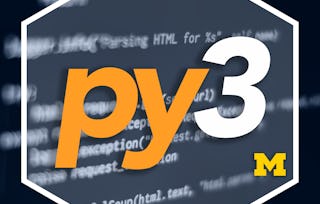The "Data Collection and Integration" course provides students with comprehensive techniques for gathering data from diverse sources, including files, relational databases, web pages, and APIs. Participants will gain practical experience in collecting and integrating data for further processing and analysis. The course emphasizes the utilization of appropriate tools and packages, such as Pandas, Beautiful Soup, and SQL, to effectively handle real-life datasets and address data integration challenges.

Data Collection and Integration

Data Collection and Integration
This course is part of Data Wrangling with Python Specialization

Instructor: Di Wu
Included with
14 reviews
Recommended experience
What you'll learn
How to utilize Python and Python packages to collect data from various sources
How to integrate data collected from various sources to a unified dataset for further processing and analysis
Skills you'll gain
Details to know

Add to your LinkedIn profile
6 assignments
See how employees at top companies are mastering in-demand skills

Build your subject-matter expertise
- Learn new concepts from industry experts
- Gain a foundational understanding of a subject or tool
- Develop job-relevant skills with hands-on projects
- Earn a shareable career certificate

There are 6 modules in this course
The "Collect Data from Files" week focuses on equipping you with the necessary skills to handle various file formats, such as txt, csv, json, xml, html, and more, for effective data collection. You will learn how to read, parse, and extract relevant data from different file types, enabling you to gather valuable information from diverse sources.
What's included
2 videos3 readings1 assignment1 discussion prompt
The "Collect Data from Web" week focuses on empowering you with the skills to extract data from various webpage formats using Python libraries like requests and Beautiful Soup. You will learn how to access web pages, retrieve HTML content, and parse the data to collect relevant information effectively.
What's included
1 video2 readings1 assignment1 discussion prompt
The "Collect Data from Database" week focuses on equipping you with the skills to interact with various SQL-like databases using Python packages. You will learn how to connect to databases, execute queries, and retrieve data from different database systems, enabling you to collect and utilize data efficiently.
What's included
1 video2 readings1 assignment1 discussion prompt
The "Collect Data from APIs" week focuses on enabling you to interact with various websites that provide Application Programming Interfaces (APIs). You will learn how to access APIs, retrieve data in structured formats (e.g., JSON or XML), and utilize Python to process and extract valuable information from API responses.
What's included
1 video1 reading1 assignment1 discussion prompt
The "Data Integration" week focuses on the techniques and methodologies for integrating data collected from various sources. You will learn how to combine and merge datasets, handle data inconsistencies, and create a unified dataset for further analysis and decision-making.
What's included
1 video2 readings1 assignment1 discussion prompt
The "Case Study" week offers you the opportunity to apply the knowledge you have learned throughout the course in a practical and comprehensive case study. You will engage in data collection from various sources, including files, SQL-like databases, and web APIs, and then integrate the collected data into a unified dataset for further analysis. This week serves as a culminating activity, allowing you to demonstrate your skills in data collection, integration, and preparation for analysis.
What's included
1 reading1 assignment
Earn a career certificate
Add this credential to your LinkedIn profile, resume, or CV. Share it on social media and in your performance review.
Instructor

Offered by
Explore more from Data Analysis
 Status: Free Trial
Status: Free Trial Status: Free Trial
Status: Free TrialUniversity of Michigan
 Status: Preview
Status: PreviewNortheastern University
 Status: Preview
Status: PreviewNortheastern University
Why people choose Coursera for their career

Felipe M.

Jennifer J.

Larry W.

Chaitanya A.
Learner reviews
- 5 stars
86.66%
- 4 stars
0%
- 3 stars
6.66%
- 2 stars
0%
- 1 star
6.66%
Showing 3 of 14
Reviewed on Dec 6, 2023
Great course, and easy to follow along to learn the material. Great exercises and practice.

Open new doors with Coursera Plus
Unlimited access to 10,000+ world-class courses, hands-on projects, and job-ready certificate programs - all included in your subscription
Advance your career with an online degree
Earn a degree from world-class universities - 100% online
Join over 3,400 global companies that choose Coursera for Business
Upskill your employees to excel in the digital economy
Frequently asked questions
To access the course materials, assignments and to earn a Certificate, you will need to purchase the Certificate experience when you enroll in a course. You can try a Free Trial instead, or apply for Financial Aid. The course may offer 'Full Course, No Certificate' instead. This option lets you see all course materials, submit required assessments, and get a final grade. This also means that you will not be able to purchase a Certificate experience.
When you enroll in the course, you get access to all of the courses in the Specialization, and you earn a certificate when you complete the work. Your electronic Certificate will be added to your Accomplishments page - from there, you can print your Certificate or add it to your LinkedIn profile.
Yes. In select learning programs, you can apply for financial aid or a scholarship if you can’t afford the enrollment fee. If fin aid or scholarship is available for your learning program selection, you’ll find a link to apply on the description page.
More questions
Financial aid available,

